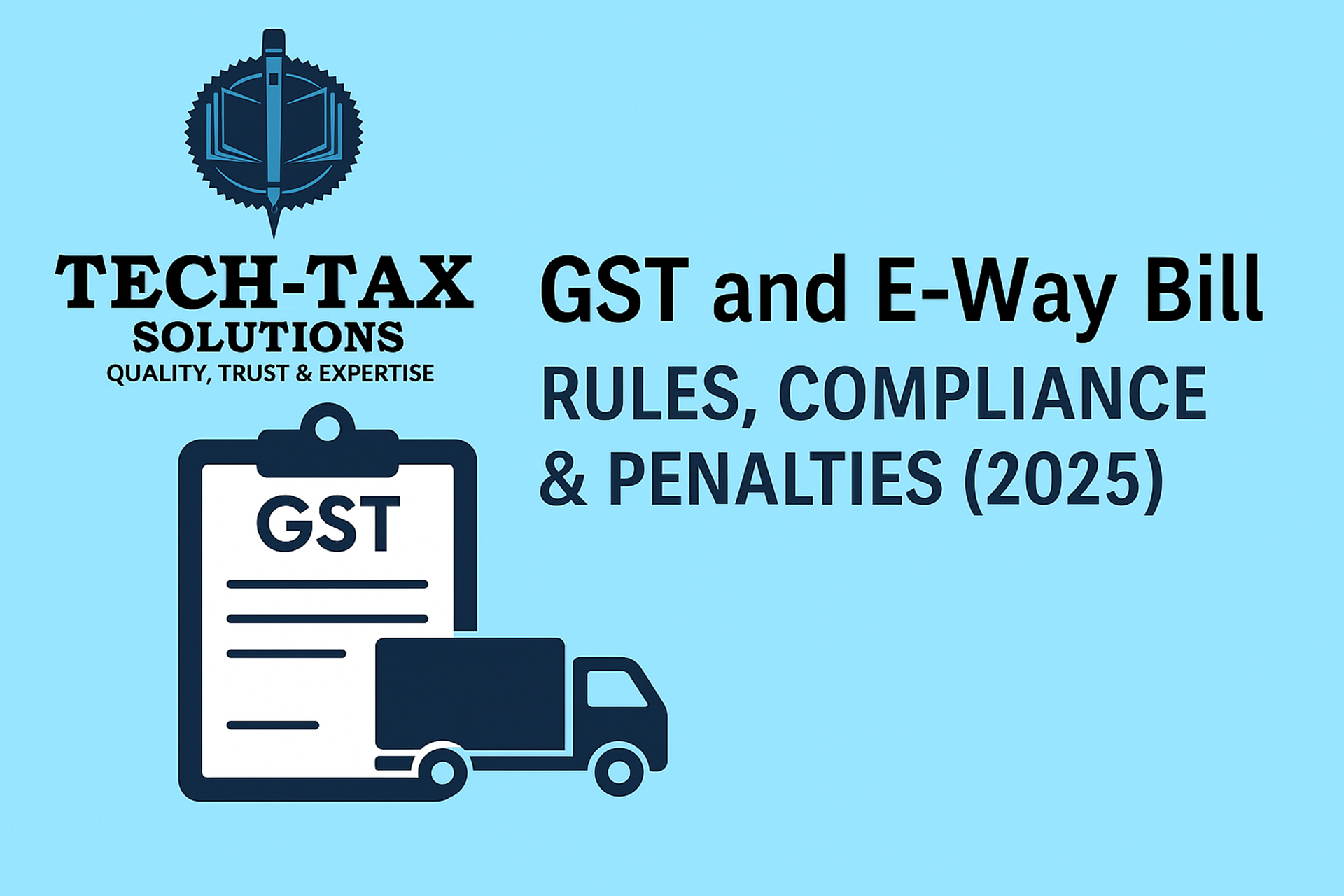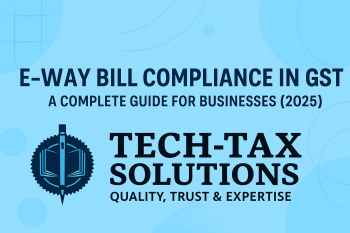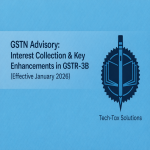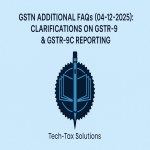🔹 Introduction
The E-Way Bill system under GST ensures tax compliance in the movement of goods. It acts as an electronic permit for transportation and helps track goods movement to curb tax evasion. For SMEs, traders, and transporters, understanding E-Way Bill compliance is essential to avoid penalties and detention of goods.
(Reference: Sec. 68 of CGST Act, Rule 138–138E of CGST Rules, CBIC notifications till 2025)
🔹 Applicability of E-Way Bill
-
Required for movement of goods valued above ₹50,000 (interstate or intrastate, subject to state rules).
-
Applies to supply, non-supply reasons (job work, return, transfer, exhibition, etc.).
-
Mandatory even if goods moved without consideration (e.g., stock transfer).
✅ Exemptions
-
Goods exempted under specific notifications (e.g., milk, fresh fruits & vegetables).
-
Goods moved within 10 km intra-city (for certain states).
-
Transport by non-motorized vehicles.
-
Goods transported under customs bond.
🔹 Process of Generating E-Way Bill
📌 Step 1: Log in to ewaybillgst.gov.in.
📌 Step 2: Fill Part A (Invoice details: consignor, consignee, value, HSN, GSTIN).
📌 Step 3: Fill Part B (Transporter & vehicle details).
📌 Step 4: System generates unique E-Way Bill Number (EBN).
📌 Step 5: Print/carry E-Way Bill copy during transit (electronically acceptable).
✅ Validity of E-Way Bill
-
Up to 100 km: 1 day validity.
-
Every additional 100 km: +1 day.
-
Validity can be extended before expiry.
🔹 Compliance Responsibility
-
Consignor (Supplier): Generate E-Way Bill when sending goods.
-
Consignee (Recipient): Ensure E-Way Bill exists for inward supply.
-
Transporter: Carry valid E-Way Bill during movement.
🔹 Common Issues in E-Way Bill
-
Wrong vehicle number entered.
-
Expiry of validity before reaching destination.
-
Not updating Part B when vehicle changed.
-
Multiple consignments in single vehicle without consolidated E-Way Bill.
🔹 Penalties for Non-Compliance
-
Sec. 129: Detention of vehicle & goods + penalty = 100% of tax or ₹10,000 (whichever is higher).
-
Sec. 130: Goods may be confiscated in case of fraud.
-
Transporters without documents: Penalty under Sec. 122.
🔹 Practical Examples
Example 1: Interstate Supply
Trader in Ghaziabad sends goods worth ₹1,20,000 to Noida. Must generate E-Way Bill with vehicle details before dispatch.
Example 2: Intra-State Movement (Exemption)
Manufacturer in Delhi sends goods worth ₹40,000 within city. E-Way Bill not required since value < ₹50,000.
Example 3: Expired E-Way Bill
Transporter carrying goods from Delhi to Lucknow (500 km). E-Way Bill valid for 5 days. If validity expired before delivery → goods liable to detention.
🔹 Best Practices
-
✅ Always reconcile invoices with E-Way Bill data.
-
✅ Train logistics staff on timely Part B updates.
-
✅ Use consolidated E-Way Bills for multiple consignments.
-
✅ Track expiry alerts and extend validity when required.
-
✅ Maintain transport agreements to defend in case of detention.
🔹 FAQs
Q1. Is E-Way Bill required for goods worth ₹40,000 interstate?
➡️ No, only if consignment value exceeds ₹50,000.
Q2. Can E-Way Bill be generated without vehicle number?
➡️ Yes, Part A can be filled. Vehicle details must be updated before movement.
Q3. Can multiple consignments be moved in one vehicle?
➡️ Yes, using consolidated E-Way Bill.
Q4. Can validity of E-Way Bill be extended?
➡️ Yes, but only before expiry.
Q5. What if transporter does not carry E-Way Bill?
➡️ Goods can be detained and penalty imposed.
🔹 Conclusion
E-Way Bill compliance is crucial for smooth movement of goods under GST. Mistakes like wrong details, expired validity, or missing Part B can lead to detention and penalties. SMEs and transporters must ensure proper E-Way Bill management to avoid disruptions.
📌 Need expert help in E-Way Bill compliance, penalties, or GST litigation?
Contact Tech-Tax Solutions – Quality, Trust & Expertise in Ghaziabad, Noida & Delhi.






